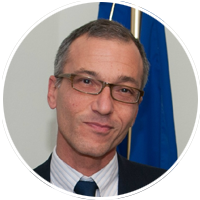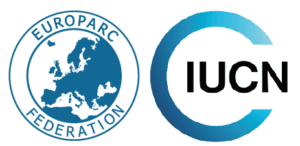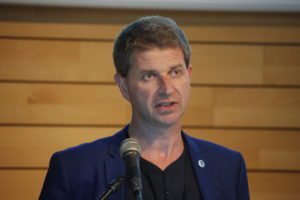Farm to Fork Conference – Building sustainable food systems together
Farm to Fork Conference
15 and 16 October, the first Farm to Fork conference took place. This event was a first common platform to bring together European Stakeholders to think about a future towards sustainable food systems.
The Farm to Fork Strategy was published by the European Commission in May 2020. It is at the heart of the European Green Deal aiming to make food systems fair, healthy and environmentally-friendly. The Farm to Fork Strategy aims to accelerate our transition to a sustainable food system that should:
- have a neutral or positive environmental impact
- help to mitigate climate change and adapt to its impact
- reverse the loss of biodiversity
- ensure food security, nutrition and public health, making sure that everyone has access to sufficient, safe, nutritious, sustainable food
- preserve affordability of food while generating fairer economic returns, fostering competitiveness of the EU supply sector and promoting fair trade
Putting our food systems on a sustainable path also brings new opportunities for operators in the food value chain. New technologies and scientific discoveries, combined with increasing public awareness and demand for sustainable food, will benefit all stakeholders
More info can be found here.
The future of our food systems
The Farm to Fork conference was hosted by the European Commissioner for Health & Food Safety, Ms. Stella Kyriakides, and the European Commissioner for Agriculture, Mr. Janusz Wojciechowski. The opening address of the Conference was given by the European Commission Executive Vice-President Frans Timmermans.
Stakeholders across the food value chain, public authorities, international and civil society organisations, as well as other citizens and the interested public joined the debate on how to contribute to the implementation of a fair, healthy and environmentally friendly food system. Stakeholder involvement on all levels is key in implementing the EU Farm to Fork Strategy and in shaping the future of food systems. The Farm to Fork conference facilitates this by creating a platform for discussion among stakeholders across the food value chain.
Starting the first day, the three Commissioners expressed the importance of the ambitious Farm to Fork strategy for acting towards sustainable food systems.
Vice President Timmermans underlined that the concrete impacts of climate change on agriculture, such as dramatic drought and catastrophic floods, show how urgent it is to change the current economic model. This is not only good for climate and environment but also for social and economic targets. Having battled cancer herself, The Commissioner Stella Kyriakides stressed the importance of healthy food in this strategy and reminded that health is a holistic concept, including humans and nature.
Health is animals, plants and human health. These are so close that we cannot look at the health perspective only from one side – Stella Kyriakides
Commissioner Wojchiecowski emphasized that general European policy on agriculture, including the Farm to Fork Strategy, wants to be better for the environment, climate and animal welfare. Additionally, it should be better for farmers as well and help protect their income.
Experts views
Apart from the Commissioners, there were expert speakers on the topics of consumption and consumer perceptions. Roberto Flore from Skylab Foodlab stressed the importance of changing consumer behaviour at home and how some changes are easily made. Professor Klaus Grunert from Aarhus University showed the results of a widespread survey that indicated that consumers find a healthy and local diet important and broadly share sustainability and health values.
Our current approach to sustainability is fundamentally flawed [..] If you want to have good food, you have to care about the environment surrounding it. Revolution begins in the kitchen – Roberto Flore
Panel discussion
The second day, which was also the World Food Day hosted a panel discussion with different stakeholders ranging from policy makers to consumer representatives. Everyone agreed that it will take all stakeholders across all sectors to move towards more sustainable food systems. This is necessary to adapt to and mitigate climate change and also reverse biodiversity decline. Farmers organisation Copa Cocega represenative Pekka Pesonen emphasised the need for funds to make such changes in agriculture.

Farm to Fork Strategy Targets
Points on which stakeholders disagreed also came up: the role of innovation and technology, what a fair price for consumers entails and whether consumers are willing to change consumption patterns were openly debated. Many stakeholders finally asked for a thorough impact assessment before the implementation of the Farm to Fork strategy, which could delay changes that are necessary now.
From conference to the field
Of course, the Farm to Fork conference is only the beginning of the transition towards sustainable food systems. The strategy will have to be implemented in many different European sectors, throughout the value chain. In a time where many important dossiers such as the Common Agriculture Policy are revised, it is key to have this strategy at the cornerstone. Otherwise, the promises of the farm to fork strategy will remain mere words.
Why is Farm to Fork important for European Protected Areas?
The ambitions and the implementation of the F2F Strategy definitely concern the European Protected Areas.
EUROPARC strictly believes in the possibility of a good and win-win alliance between biodiversity conservation and sustainable agriculture and fishery sectors. For many years, EUROPARC Federation and its members has been reinforcing the dialogue with farmers in and near National and Regional Parks, as well as with the fishermen in Marine Protected Areas. Favouring those partnerships contributes to improve the status of farmers and fishermen by rewarding their effort to include nature conservation in their practices and by promoting local, nutritious and sustainable products.
The Farm to Fork Strategy recognises the inextricable links between healthy people, healthy societies and a healthy planet. The key mission of the Protected Areas is to guarantee healthy habitats: EUROPARC is committed to promote the key contribution that protected areas provide to human health, with the campaign of Healthy Parks, Healthy People.
More on the topic of sustainable agriculture and health can be found here:
- https://www.europarc.org/european-policy/farm-to-fork-protectes-areas/
- https://www.europarc.org/knowlege-hub/sustainable-agriculture/
- https://www.europarc.org/knowlege-hub/health-green-exercise/
Interested in the F2F conference? Find the recordings of the two days here:
[WEBINAR] Towards a NO-Plastic Sea: EU policies and Marine Protected Areas actions
This webinar on the 10th of November at 11 AM CET will look at EU policies and Marine Protected Areas actions
- Tuesday, 10th of November 2020
- 11:00 AM CEST
- participation is free but registration is needed. Register here.
Within the context of the European Green Deal, and in particular the Circular Economy Action Plan and Biodiversity Strategy, this webinar will explore Marine Protected Areas and plastic pollution. We will take a closer look at some of the issues of addressing plastic pollution in Marine Protected Areas, through a number of case studies across Europe. The session will bring together EU policy makers, European MPA managers, representatives from the private sector, and other stakeholders, to discuss the challenges and potential ways forward. The session will serve as an opportunity for the exchange of knowledge, ideas and recommendations about the implementation of the relevant elements under the European Green Deal.
Agenda:
Welcome from EUROPARC, introducing the topic from the Protective Areas perspective
By Fernando Pinillos, Communications and IT Officer
Welcome from IUCN from the plastic challenge perspective
By Alberto Arroyo Schnell – International Union for Conservation of Nature (IUCN).
Setting the scene: EU policies against marine litter and the Green Deal perspectives
By Michail Papadoyannakis – European Commission, DG ENV.
Case Study: The Plastic Waste-Free Islands initiative
By Joao Sousa – International Union for Conservation of Nature (IUCN).
The Plastic Waste-Free Islands initiative (PWFI) is part of IUCN’s global Close the Plastic Tap Programme. Working in three regions, the Caribbean, the Mediterranean and Oceania, the initiative’s overarching goal is to drive the circular economy agenda forward and to reduce plastic waste generation and leakage from islands. Joao Sousa’s presentation will focus on the Mediterranean region, exploring in particular the example of Menorca, which was declared a Biosphere Reserve by UNESCO in 1993.
Case Study: The MEDSEALITTER project: Developing Mediterranean-specific protocols to protect biodiversity from litter impact at basin and local MPAs scales
By Odei García-Garin – University of Barcelona/ Interreg MEDSEALITTER project.
The MEDSEALITTER project developed standard monitoring protocols to protect biodiversity from marine litter. The monitoring of marine litter is essential to evaluate risks and mitigation policies. Furthermore, to understand the possible sources and pathways through the environment and to promote new legislative initiatives against plastics. The MPA managers are the key component to conduct a regular marine litter monitoring within the Marine Protected Areas.
Discussion and other perspectives.
All participants will have the opportunity to raise their comments and questions, and to hear the perspectives from the private sector and other stakeholders.
Get to know the speakers!

Michail Papadoyannakis has worked in the European Commission on research, industrial policy and environmental issues, covering also project management and international relations. Within the Environment Directorate General he has been dealing mainly with issues of waste management, hazardous substances and, since 2009, marine environment issues focusing on the implementation of the EU Marine Strategy Framework Directive, links with Regional Seas Conventions around Europe and marine litter.

Joao Sousa is a Marine Project Officer at International Union for Conservation of the Nature (IUCN) where he focuses on collaborative solutions to mitigate plastic debris in the world’s oceans. This involves coordinating research to inform policy, creating platforms to encourage innovation and sharing of best practices, and cooperating with industry to change behavior. Joao also works on conservation and mitigation for the oil and gas industry in the North Sea (decommissioning platforms) and private sector engagement for best practices in the production, extraction and transformation sectors in Mozambique.

Odei García-Garin is a biologist PhD candidate currently working at University of Barcelona on the occurrence, distribution and abundance of marine litter and its impact on marine fauna. He is focused on analysis of microplastics and plasticizers, techniques of remote sensing and monitoring of marine vertebrates.
This webinar is organised by

The EU Green Deal immediately eroded by the industrial agriculture lobby?
© Agriculture_European Commission
EUROPARC’s President Ignace Schops responds to the vote on the Common Agricultural Policy
Last week, the European Parliament voted the Common Agricultural Policy (CAP) 2021-2027. The result contrasts sharply with the objectives of the EU Green Deal of European President Ursula von der Leyen and EU Vice President Frans Timmermans.

Ignace Schops
Is this about a sustainable and socially responsible food supply or about a well-organised hold-up by the large industrial agri-companies, that seem to show little concern for the health of our planet?
The EU Commission’s initial proposal was quite defensible because it was –in some ways- more in line with the objectives of the EU Green Deal, even if it had been proposed by the previous Commission. Some European Parliament amendments were trying to improve it and makes it more coherent with the Farm to Fork Strategy.
The EU’s “From farm to fork” strategy promotes short-chain agriculture, aims at socially correct, sustainable reform with much more focus on nature and climate. The EUROPARC Federation, is very supportive of farm to fork strategy with the necessity for farms in and around Protected Areas to work in a more constructive partnership.
But what happened? A majority coalition of MEPs rejected the amendments that would bring about closer alignment to the Green Deal, potentially undermining all progress. This was the same parliament that voted the Green Deal, approved the EU Biodiversity Strategy 2030 and supported the progress in making an EU climate law!
Poisoning the CAP is not only a lethal injection for the health of our planet, agro-industry is also paid generously for it. Agriculture accounts for 40% of the total European budget. That is a great deal of money. 80% of this budget goes to the large agro-industrial companies which represent only 20% of European farmers. It becomes clearer when you turn the argument around. 80% of European farmers have to survive on just 20% of the already poisoned budget.
On the heels of many thousands of farmers, industrial agro-agriculture can continue with the natural and environmental conditions that give agriculture a future just to die. This decision is not for, but above all, against the well-meaning farmers with responsible craftsmanship. Those who do have an eye for bees, butterflies and birds and who want to help and build a sustainable, climate-proof and nature-friendly food supply.
Ladies and gentlemen of the EU Parliament: please inform yourselves, do not just listen to the agro-industry lobbyists. Do not be tempted by fake facts. The industrial farming lobby is pleased, they say this decision gives clarity to the farmers. What clarity? and to which farmers? Financial clarity for just a few or deadly clarity for the health of our planet?
So, EUROPARC calls upon farmers to unite with nature and climate movement! We are natural allies! Things can and must be done differently if we are to have farming that is good for people and nature!
Ignace Schops
VI Conference of the Iberian Network of the European Charter for Sustainable Tourism
Logo of "The Charter"
On 4-5 of November, the Iberian Network of the European Charter for Sustainable Tourism will host its VI Conference!
The municipality of Sabugal, EUROPARC Spain and EUROPARC Federation will organise the sixth conference of the Iberian Network of the European Charter for Sustainable Tourism (ECST), which will take place online on the 4th and 5th of November 2020. At the conference participants will be able to get to know the ECST as a participatory planing instrument for sustainable tourism in protected areas (PAs). The conference is for free, but registration is needed.
The Conference will be held in Zoom platform and will be in Portuguese and Spanish with simultaneous translation Pt-Es.
You can register here!
The European Charter for Sustainable Tourism Network in Spain and Portugal is an initiative of the Spanish and Portuguese parks, which have obtained this recognition, together with EUROPARC. It was created with the aim of encouraging communication between the actors involved in the project and promoting actions and networking in the Iberian Peninsula. Its organisation alternates between Portugal and Spain. The Network comprises a total of 35 protected areas, 27 in Spain and 8 in Portugal.
Why join the conference?
The conference will:
- Deepen issues related to sustainable tourism and the ECST instrument, which are of special interest to PAs;
- Promote the exchange of experiences and present some practical cases developed in the PA of the ECST Network in relation to the Covid-19 context and the proactive way in which these parks had to manage and adapt to the situation;
- Strengthen and consolidate the network operation of the PAs and tourism companies in Spain and Portugal that are recognized as Charter partners of the ECST;
- Identify communication, promotion, organization and sale strategies for ECST destinations and their member companies;
You can find the programme here.
Who should join?
The conference is addressed specifically to:
- Directors and technical personnel from Protected Areas with ECST (or in the process of joining);
- Tourist companies adhering to the ECST Phase II or who are members of the Forum;
- Travel agencies adhering to the ECST Phase III or who are members of the Forum;
- Public / private entities in Protected Areas with ECST or in adherence;
- Other corporate bodies, associations and other agents, students, etc.
The conference is an excellent opportunity to get to know other ECST partners, address problems or opportunities and network with like-minded institutions and Protected Areas.